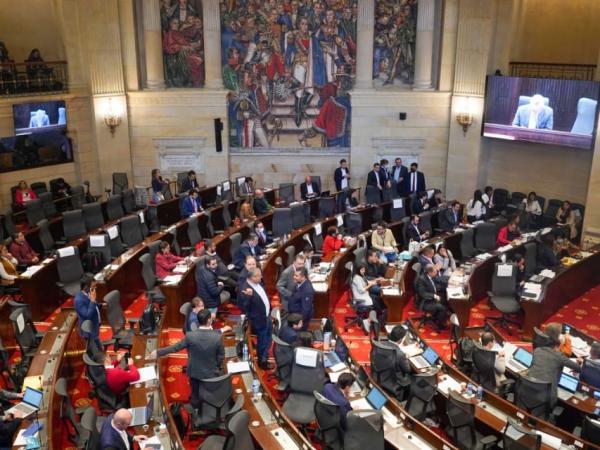Once the first proposals of the Ministry of Finance have been put on the table regarding what they have planned for the financing law with which they seek the $12 billion that they need in the General Budget of the Nation for next year, it seems that the accounts do not convince Congress. where there are already some proposals to protect the country’s fiscal stability.
And it is that less than a week before the deadline to approve the amount expires In terms of the general expenditure of the 2025 budget, the Senate and the House would not have been well received if the Government had linked investment to the need to make a change to the tax scheme, since in certain political groups it was seen as a pressure that is not good, taking into account the current economic situation.
Read here: Pension reform regulation would be in three decrees: what is the status of the process?
Moving on to a reform
In an interview with Portafolio, the President of Congress, Efraín Cepeda, spoke about a proposal that he submitted to the Ministry of Finance during the meetings to review the General Budget of the Nation, which consists of separating the financing law from this project and better processing everything as a tax reform next year.
“It is a proposal signed by a plural number of congressmen that goes in that direction, because I believe that it is not responsible to the country, nor is it responsible to the Congress of the Republic, to approve a tax reform blindly. Because although yesterday we were given some strokes of the pen of what the reform could be, well, that requires first an article, second a thorough study, third, look at the affected sectors and also be able to listen to them,” Cepeda said.
Ministry of Finance – Ricardo Bonilla.
Courtesy – Ministry of Finance
The Senate President warned that “tax reform is a very responsible issue for us, simply including $12 billion there without knowing what will or will not be approved when it is presented. I have said that the responsible thing to do is to discuss the general budget of the Nation for 2025 without those $12 billion, then discuss the tax reform separately and whatever comes out of it is done in an additional budget, as was done with the previous tax reform.”
That being the case, if the path proposed by Senator Cepeda were followednext year’s budget would drop to $511 billion, eliminating the revenue expected by the financing law, and everything would be set to quickly debate a new tax law in the second half of this legislative period, which begins in February.
More news: Four out of 10 domestic workers do not earn the minimum wage
“Approving something like this is leaving open a path that we don’t know how far it can go, how far it can be approved. That’s why we say, first the tax reform and then we add the budget, that is absolutely fixed, we did it like that a couple of years ago, so it is a path that we already know we can do, but when we have certainty about everything that is wanted,” said Efraín Cepeda.
Implications of reform
The financing law and the tax reform, although similar in some aspects, have key differences in their purpose and scope. According to José Manuel Restrepo, rector of the EIA University and former Minister of Finance, the former is a relatively new figure that is used specifically to cover a deficit. in the national budget, so its objective is to ensure a certain amount of income.

Colombian pesos.
iStock
“This is defined by Article 347 of the Political Constitution, which authorizes the government to propose a law that allows for obtaining new revenues or modifying existing ones to fill a gap in the national budget. It follows an express procedure in Congress, meaning that the economic functions work together and can be approved and discussed in parallel with the discussion of the budget law,” said Restrepo Abondano.
On the other hand, the tax reform, as Carlos Rodríguez explainsEsguerra JHR partner, has a broader and more general approach, which is mainly aimed at modifying the Tax Statute to adjust rates and tax bases, such as income tax or VAT, without necessarily being linked to a budget deficit. Its main purpose is to optimize tax collection, although it may also include structural changes that affect the tax system as a whole.
“These are laws that have a focus on long-term collection of rates and tax bases such as income tax or VAT at the initiative of the Executive; beyond providing urgent solutions to a scenario of budgetary balance, since in the face of a deficit budget, tax reforms are made that affect collection, but are also aimed at economic activation,” added Rodriguez.
The latest: Labor reform already has defined dates to complete its process in the House
Simple Regime
After the proposed financing law was announced, still not structured in an official document, Representative Wilmer Castellanos, coordinator and rapporteur of the 2025 Budget, said that there are things he likes, but others that worry him.
“Contradictory issues such as the proposal to raise VAT from 5% to 19% on hybrid vehicles or to impose VAT on Airbnb services generate uncertainty. Also, raising the tax on carbon emissions due to the implications on fuel prices or the possibility of proposing the payment of taxes via non-deductibility of unproductive properties of legal entities,” said this congressman.

Taxes
iStock
Finally, one of the most striking criticisms is that of the former director of the Dian, Lisandro Junco, who argued that we are not building on what we already have, but rather we are basically starting from scratch, ignoring the success stories that exist in recent history in terms of tax collection, such as the one achieved with the simple tax regime.
“What we were looking for was the same as the single tax and was to combat informality with a simple tax system. And we achieved it because the simple system allows different types of taxes and compliance charges to be merged and there you find the income tax, the sales tax or the VAT. It also unifies municipal taxes such as the Industry and Commerce Tax, the Tax on Advertisements and Billboards and the Fire Surcharge,” said Junco, for whom all this made taxation easier for small businesses.
Regarding its results, he concluded by saying that “this simplicity has generated a historic collection in which, as of July 2024, only the simple regime has already reached $1.8 billion, that is, everything that was collected in all in the year 2023”, while stressing that the intention to end it was born out of the displeasure of this Government because “it was not created by them.”















